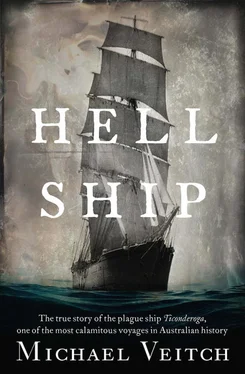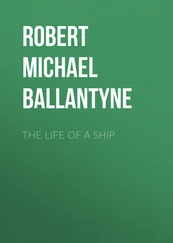With a huge workload, little help and not much he could practically do to help his patients in any case, Dr Taylor began to feel the stress of his position acutely. A few days into the posting, his wife and his two eldest sons arrived, his wife to assist him on board the Lysander , making up tinctures and prescriptions, and his sons to help with the distribution of the stores. It would all end badly for Dr Taylor. A year later, he recounted his take on the whole sorry experience at Point Nepean in a long and somewhat wounded letter to Lieutenant-Governor La Trobe, in which he recounts a litany of injustices, particularly at the hands of Thomas Hunt, the man who had given him the job in the first place, but with whom he soon seriously fell out. Judging by the tone of his account, however, Taylor seems to have clashed with everybody—particularly the two men who were ostensibly there to assist him, Drs Sanger and Veitch:
The first surgeon of the ship, complained Taylor, was himself all of fever and altogether unable to render any assistance, while the junior surgeon, a young man without experience and of intractable temperament, was comparatively useless. [6] Letter from Dr Taylor to Governor La Trobe, 4 November 1853, Victorian Public Records, VPRS 1189/132 D 12053
Taylor’s is the splenetic rant of a man taxed beyond his capacities by a still desperate situation. In describing the entire set-up of the station as chaotic, he was undoubtedly correct. At one stage, he even had to shoot a stray bullock that had wandered into the station, then organise the cow-proof fence to prevent further bovine incursions. Overwhelmed, he could barely sleep, and was deprived of even some of the most basic necessities to make his tenure bearable:
Such excessive labour and mental anxiety, together with the want of sleep for many nights in succession, soon began to exhibit their depressing effects on the system. My legs swelled more and more, my appetite failed and at last when in the nighttime, after writing out my Report for the day, on the ground having neither chairs nor tables. I could find time for an hour’s rest that rest was denied me by the violent cramps which attacked my legs the moment I had fallen asleep. [7] Letter from Dr Taylor to Governor La Trobe, 4 November, 1853
Aside from this, Taylor suffered acute diarrhoea, as well as the ignominy of the theft of his personal property, including his bed, forcing him to sleep on the ground, followed by his personal trunk being ransacked, with persons unknown making off with some of his clothes.
It appears that when Dr Hunt travelled down to Point Nepean on or about 9 November, he formed the opinion that Taylor was not the right person for the job and began moves to terminate his position once a replacement could be found. Lieutenant-Governor La Trobe, however, seems to have been left out of this particular intrigue, and was apparently put in the embarrassing position of calling upon Taylor on his one visit to the station in December, dining with him and renewing his appointment, only to have him summarily dismissed by Dr Hunt a few days later. When informed of his sacking, in person by Dr Hunt, a flabbergasted Taylor challenged Hunt’s authority to dismiss him from an appointment ordained by the Lieutenant-Governor himself. According to Taylor, Hunt’s response was to threaten to pull the poor man’s tent down if he failed to vacate the area within two days.
In a letter informing La Trobe of his actions, Hunt stated: ‘I have this day dismissed Mr Joseph Taylor from the office of Resident Surgeon and Store keeper at the Sanitary Station Ticonderoga… I find him a very inefficient officer, much more given to talk than act.’ [8] Letter from Dr Hunt to Governor La Trobe, 6 January, 1853, VPRO 1189/131
Then, piling woe upon woe, Taylor contracted typhus, which had him in its grip until well into the new year, ‘from that time up until the middle of April, all is lost history to me, remembering nothing except some dreamy wanderings of my brain’. [9] Letter from Dr Taylor to Governor La Trobe, 4 November, 1853
* * * *
Only very slowly did the death rate begin to decrease once the Ticonderoga ’s passengers reached quarantine. On 20 November, The Argus , eager to keep its fixated readers up to date with the latest lurid details from Point Nepean, reported:
Frequent deaths are still taking place amongst the unfortunate emigrants of the Ticonderoga , five having occurred the other day; two more surgeons have been sent down and Dr Hunt, the Health Officer at Williams Town [ sic ] proceeded to Point Nepean yesterday to see if any further measures could be adopted for the improvement of the Quarantine Station at that place.
On 16 November, John Hando, 49, whose sixteen-year-old daughter Anna Maria had been one of the Ticonderoga ’s first victims on 23 August, also died. A broken heart could well have hastened his demise. In October, he had also lost his wife, Maria, and just four days earlier, his remaining daughter, Emma, also perished. Only eighteen-year-old Charles and his two brothers, aged seven and ten, were left of the family of seven that had boarded the ship thirteen weeks earlier.
Another of the English passengers, Mary Ann Cheeney, 33, died on 16 October, leaving her husband alone to raise their children, William and Mary, both under ten; Elizabeth Taylor, one, became the sole victim of her family the following day, and Janet Mattheson, twenty, died just one day before her infant son, George.
Perhaps one of the most poignant stories was that of one of the few childless couples on board the Ticonderoga , Andrew and Margaret Rutherford, aged 27 and 28 respectively, and about whom little else is known. Margaret had died on one of the ship’s last days at sea, possibly even within sight of land, on 31 October, while her husband passed away in quarantine twenty days later, on 20 November. Unlike most of the ship’s other victims, whose families were able, despite the tragedy of losing loved ones, to go on to establish family roots in Australia, nothing whatever remained of Andrew and Margaret’s bold endeavour to come to Australia on the ship that would cost them their lives.
A few days before Christmas Day 1852, the Scots McIvor family were preparing for the Yuletide in their home in Coburg, a suburb to Melbourne’s north, just a little off the track that would, after an extremely arduous journey of several weeks, eventually lead to Sydney. Not that the McIvors had ever taken that journey themselves, and nor were they likely to. Having migrated from Scotland a decade earlier, they had done all the travelling they ever intended to do. Nevertheless, many of their traditions had been brought with them, and one of those was the celebration of a very Scottish Christmas. Being Presbyterians, there was little in the way of showiness, but one or two hymns, a shortbread and a haggis could always be counted upon. This year, however, a sense of unease was running through the family, as it was for many of the Scots of Melbourne. Certainly, every Christmas in this new country was somewhat odd, occurring as it did in the midst of a summer that, before leaving the frigid climate of Inverness, they scarcely believed was possible.
The talk among the Melbourne Scots this Christmas was of the ship that had arrived at the Heads some weeks back, and was still confined to quarantine. A thousand Highlanders were said to be aboard her, and the loss of life had already been terrible. However, no passenger list was as yet available, so no one could have any idea who was on board. McIvor, in his sixties and very much the patriarch of the family, tried not to listen to the rumours, but as time went on, they became virtually unavoidable. The papers—his friends were telling him—were starting to talk about this ‘fever ship’, this ‘plague ship’ and her sorry passengers, stranded and sick, so close yet so far from their destination of Melbourne. ‘The unfortunate new arrivals,’ penned McIvor’s grandson John Andrew McIvor many years later, in an article that appeared in The Argus in August 1934, ‘were as remote as though on a distant island.’ Old McIvor had been lucky, he knew. The ship on which he and his family had made the voyage had been a small one, and illness had hardly gained a foothold, despite the journey having taken much longer than that of the Ticonderoga.
Читать дальше












